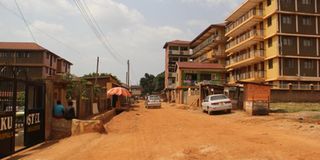Know your hood: Kikoni, Where student hostels reign supreme

Kikoni still has the makings of a slum with closely spaced shanty houses. However, in the last decade or two, students hostels (right) have been constructed in the area, leading to more developments like a good road and businesses targeting the students. PHOTO by Ismail Kezaala
What you need to know:
Once mostly a slum, Kikoni has shed some of its shanty structures for sturdy buildings most of which are Makerere University student hostels.
When one mentions Kikoni, the first thing that comes to one’s mind is the students of Makerere University. Many reside there. However, 40 years ago when one said they stayed in the suburb, they were perceived as very low income earners or a loiterer. Since most of the houses were built with mud and wattle, rent was affordable.
William Mukiibi, the LC1 Chairman of Cell A in Kikoni says from the 1970s to late 1980s, the suburb was a meeting joint of sorts for the enthusiasts of malwa, a local brew.
“There were several makeshift bars where people – especially from northern Uganda - met to enjoy the drink. This was routine, irrespective of the day of the week. Congolese music was always playing to entertain them.
Like is typical of an area like this, physical fights under the influence of the liquor were the order of the day. Patrons who frequented the malwa joints were an easy target for the loiterers,” narrates Mukiibi.
Developments over the years
Fast forward to 2014, Kikoni is teeming with storeyed buildings most of which house hostels, hotels, supermarkets, guest houses and education institutions. The genesis of this development is traced to a policy adopted by Makerere University in the early 1990s, to admit private students. These students had to cater for their residence.
“The few residents who had permanent structures started rehabilitating them to tap the money from the virgin market. Others vacated their homes for the students to rent. Restaurants sprung up. More shops were opened and the existing ones were stocked more,” Mukiibi says.
Over the years, astute businesspeople woke up and smelled the prospects of investing in students’ accommodation. The LC1 Chairman says some of the first hostels in Kikoni were Garden Courts and Grand Hostel. “Thereafter, more hostels were built. Today there are the likes of Baskon, Kaan, etc,” he says.
Besides the hostels and supermarkets, another outstanding landmark is a church, University Church Fellowship (UCF), which is host to several students from the hostels.
Improved transport
The difference between the Kikoni of 20 years ago and the Kikoni of today can also be found in the transport services to the place. Paul Kagumire, a resident of the suburb notes that until around 2000, there was no Kikoni stage in the taxi park.
He says this could be attributed to the poor state of the road which linked the suburb to the city.
It was not tarmacked and was pothole laden. To get to Kikoni, one would have to take a taxi from town to Nakulabye or Wandegeya and then walk to the suburb. That has all changed. For Shs1,200 or Shs1,000, one can get to Kikoni in a taxi. Boda bodas charge between Shs3,000 to Shs2,500 from town.
Security
The suburb has two police posts, one in cell A and another in Cell B. A police officer at the post in Cell B who was unwilling to reveal his name, informed me that most of the cases that they register are theft related.
“They are usually cases of stolen laptops and break-ins. When students leave for holidays, the lurking hooligans take advantage of the absence and break into their rooms. Surprisingly the criminals are not residents of this place, they come from slums in Nakulabye such as Kiwunya and Kiyaaye,” he says.
The recent notable progress in Kikoni is the tarmacking of the road that connects it to Kasubi. The LC1 Chairman predicts that this is going to attract more development in the area and transform a place that still has slum areas.
Land. William Mukiibi, the LC1 Chairman of Cell A, Kikoni shares that because more people find the area profitable, the cost of land in the suburb is very high and it hard to come across land that is up for sale. One has to have above Shs200m to be able to buy a suitable piece of land.
Most of the land is Mailo land. There is a small strip of Kabaka’s or Crown land at its border with Kawala.
Housing. One also has to have above Shs150,000 to rent a convenient single-roomed house. Most of the accommodation in the area is paid per semester for students from Makerere University, Law Development Centre and Makerere Business Institute.




